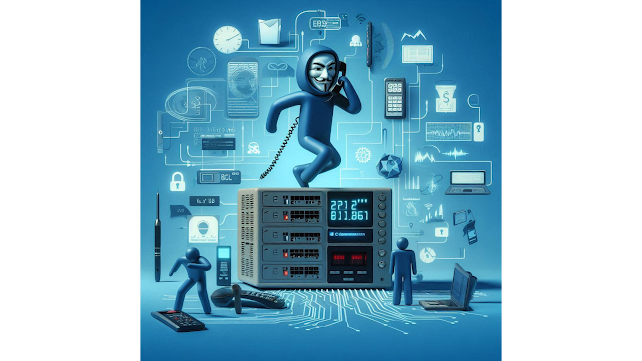In the modern telecom landscape, where billions of calls are made daily, Caller ID spoofing has become one of the most prominent threats, challenging both operators and end-users. This technique allows malicious callers to manipulate Caller ID information, often to impersonate trusted entities like banks or government agencies. The aim is typically to deceive recipients into divulging personal information or accepting fraudulent calls. As the telecom industry grows, so does the sophistication of these spoofing methods.
At DenovoLab, we understand the stakes and have developed solutions tailored for telecom operators who need real-time, robust mechanisms to detect and block Caller ID spoofing.
What is Caller ID Spoofing?
Caller ID spoofing occurs when a caller deliberately falsifies the information transmitted to display a different number on the recipient’s phone. This deceptive tactic is often employed by scammers and fraudsters who seek to mislead call recipients by appearing as trustworthy entities. The rise of robocalls, combined with spoofing techniques, has worsened the problem, creating both a security and trust crisis within telecom networks.
Why Caller ID Spoofing is a Growing Threat
The increasing reliance on digital communication, combined with the accessibility of spoofing technologies, makes this form of fraud pervasive and damaging:
Eroding Trust in Caller ID: When users receive a call, they expect that the displayed information is accurate. Frequent spoofing attacks undermine this trust, impacting the reputation of legitimate businesses and telecom operators.
Financial and Reputational Loss: Spoofing has real-world consequences, leading to financial scams that affect individuals and businesses. For telecom providers, failure to address spoofing can mean penalties, compliance breaches, and a damaged reputation among customers and partners.
Regulatory Pressures: With growing incidents, regulatory bodies like the FCC have tightened their stance on telecom security, implementing mandates that call for stricter controls, such as STIR/SHAKEN frameworks. Providers need to stay compliant with these regulations to avoid legal repercussions.
How DenovoLab’s DNL Switch Prevents Caller ID Spoofing
DenovoLab’s DNL Switch is equipped with advanced features specifically designed to combat spoofing and safeguard network integrity. Here’s how it stands out:
STIR/SHAKEN Authentication: The STIR/SHAKEN protocol is a robust framework that authenticates calls and verifies the caller’s identity. By signing and validating calls through cryptographic signatures, STIR/SHAKEN identifies legitimate calls and flags potentially spoofed ones. DNL Switch seamlessly integrates STIR/SHAKEN into its core operations, ensuring compliance and building trust.
Algorithmic Traffic Analysis: Our switch continuously monitors call patterns and behavior to detect unusual or suspicious traffic. This real-time analysis allows operators to respond proactively to spoofing attempts, blocking malicious traffic without impacting legitimate calls.
Advanced Filtering Mechanisms: With integrated Do Not Originate (DNO) lists and other filtering protocols, the DNL Switch can instantly block calls from flagged numbers. This powerful feature adds another layer of defense, ensuring calls originating from known spam or fraudulent numbers are stopped before they reach the recipient.
Customizable Blocking Policies: Each operator has unique requirements, so we provide custom blocking policies that can be tailored to specific thresholds, call sources, or regions. This flexibility empowers telecom providers to fine-tune their spoofing defenses according to their network demands.
Real-Time Reporting and Analytics: DNL Switch offers detailed analytics that provide insights into the type and frequency of spoofing attempts, enabling operators to adapt and refine their security measures over time.
Real-World Impact: Protecting Revenue and Reputation
For telecom providers, caller ID spoofing doesn’t just mean potential fines—it can also lead to revenue loss from reduced call completion rates. When end-users ignore calls due to a lack of trust in caller ID, legitimate businesses suffer. DenovoLab’s solutions help operators retain trust, keeping call connections high and minimizing dropped call rates. This proactive approach reduces complaints, protects revenue, and reinforces trust between operators and end-users.
The Importance of Staying Compliant and Ahead of Threats
Regulations around caller ID spoofing, such as the STIR/SHAKEN framework, are becoming more stringent worldwide. DenovoLab’s DNL Switch is built to meet these compliance standards, equipping telecom providers with the technology to ensure their network is protected and compliant.
Conclusion: Secure Your Network Against Spoofing with DenovoLab
Caller ID spoofing is a threat that requires proactive, advanced solutions. With DenovoLab’s DNL Switch, telecom operators can protect their networks from spoofing, enhance caller trust, and ensure compliance with industry standards. Our cutting-edge security measures, including STIR/SHAKEN integration and advanced filtering, offer a comprehensive defense against the evolving challenges of telecom fraud.
Take action today to protect your network from spoofing attacks. Visit www.denovolab.com to learn how our DNL Switch can safeguard your telecom operations.








0 Comments